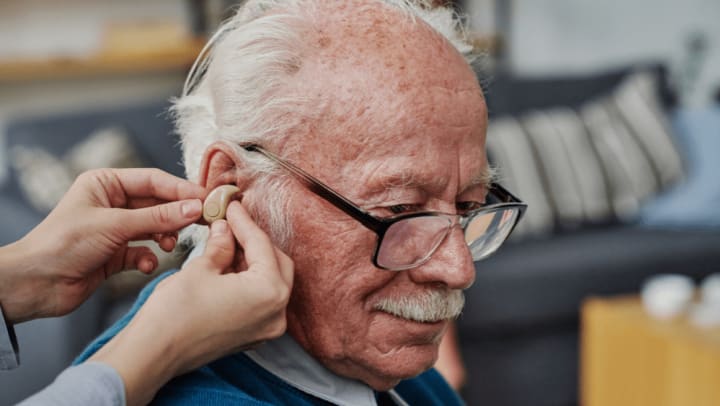Among the many health challenges faced by older adults, hearing loss and dementia are particularly significant due to their profound impact on quality of life. Recent research has revealed a strong connection between hearing loss and dementia, highlighting the need for comprehensive care that addresses both cognitive and auditory health.
Understanding Hearing Loss and Dementia
Hearing loss is a common issue among older adults, with approximately one-third of people aged 65 to 74 experiencing some hearing impairment. This condition can result from various factors, including prolonged exposure to loud noises, genetic predispositions, and the natural aging process.
In recent years, mounting evidence has suggested a significant link between hearing loss and dementia. Dementia encompasses a range of cognitive disorders—including Alzheimer's disease—and is characterized by memory loss, impaired judgment, and difficulty with thinking and reasoning. While these two conditions may seem unrelated, studies have shown that individuals with hearing loss are at a higher risk of developing dementia. One study conducted by Johns Hopkins Medicine found that mild hearing loss doubled the risk of dementia, while moderate hearing loss tripled the risk and severe hearing loss increased the risk fivefold. This connection underscores the importance of addressing hearing loss as an isolated issue and a potential factor in cognitive decline.
The Impact of Hearing Loss on Cognitive Function
Hearing loss can have a direct impact on cognitive function through several mechanisms:
- Increased Cognitive Load: When hearing is impaired, the brain must work harder to process auditory information. This increased cognitive load can divert resources from other cognitive processes, potentially accelerating cognitive decline.
- Social Isolation: Hearing loss can lead to social withdrawal, as individuals may struggle to communicate effectively and participate in conversations. Social isolation is a known risk factor for dementia, as it reduces mental stimulation and engagement, both of which are crucial for maintaining cognitive health.
- Changes in Brain Structure: Research indicates that hearing loss can lead to changes in brain structure and function. Areas of the brain responsible for processing sound can shrink or become less active, potentially affecting other cognitive functions.
- Reduced Auditory Stimulation: The brain requires auditory stimulation to remain healthy and active. Hearing loss reduces this stimulation, which can contribute to cognitive decline over time.
The Role of Cognitive and Auditory Health in Overall Well-being
Maintaining cognitive and auditory health is essential for overall well-being in older adults. Cognitive health ensures the ability to think, learn, and remember, which are all vital for independence and quality of life. On the other hand, auditory health is crucial for effective communication, social interaction, and engagement with the environment.
Addressing hearing loss early and effectively can help mitigate its impact on cognitive health. Regular hearing assessments should be part of routine healthcare for older adults, allowing for early detection and intervention. Hearing aids and other assistive devices can significantly improve hearing and reduce the cognitive load associated with auditory processing. These devices enhance communication and support brain health by providing necessary auditory stimulation.
The Impact of Hearing Loss on Individuals with Dementia and Their Caregivers
For individuals already living with dementia, hearing loss can exacerbate symptoms and complicate care. Effective communication is essential for managing dementia, enabling caregivers to provide appropriate support, understand needs, and reduce frustration for both parties. Hearing loss can hinder this communication, leading to increased confusion, agitation, and isolation for individuals with dementia.
Caregivers, in turn, face additional challenges when managing both hearing loss and dementia. They may need to repeat themselves frequently, use alternative forms of communication, or navigate misunderstandings. These challenges can lead to caregiver stress and burnout, impacting their health and well-being.
Strategies for Supporting Cognitive and Auditory Health
Implement the following strategies to support cognitive and auditory health in older adults:
- Regular Hearing Assessments: Routine hearing tests should be part of standard healthcare for older adults. Early detection of hearing loss allows for timely intervention, which can help prevent further cognitive decline.
- Use of Hearing Aids and Assistive Devices: Hearing aids and other assistive devices can significantly improve hearing and communication. These tools should be tailored to individual needs and regularly adjusted to ensure optimal performance.
- Promoting Social Engagement: Encouraging social interaction and participation in community activities can help mitigate the effects of hearing loss and reduce the risk of dementia. Group exercises, book clubs, and social gatherings provide mental stimulation and support cognitive health.
- Cognitive Training: Cognitive exercises and brain-training activities can help maintain cognitive function. Puzzles, memory games, and learning new skills are excellent ways to keep the brain active and engaged.
- Creating a Supportive Environment: It is crucial to create an environment that supports effective communication for those with hearing loss and dementia. Strategies include reducing background noise, speaking clearly and slowly, and using visual aids to supplement verbal communication.
- Caregiver Support and Education: Caregivers should receive training and resources to help them manage the dual challenges of hearing loss and dementia. Support groups and respite care can also provide much-needed relief and assistance.
Enhancing Life Through Better Hearing
The connection between hearing loss and dementia highlights the importance of comprehensive healthcare that addresses cognitive and auditory health in older adults. By understanding and reducing the impact of hearing loss, we can support cognitive function and overall well-being. Prioritizing cognitive and auditory health enhances individual lives and fosters a more supportive and caring community.
At Clearwater Living®, we provide a holistic wellness approach through our Empowered Living® lifestyle philosophy. By incorporating the Six Dimensions of Living Well, Clearwater has created a supportive environment with tools and resources for those with hearing impairment and offers a variety of programs to activate mental stimulation and social engagement.
Contact us today to learn more about Clearwater Living and holistic wellness for an improved quality of life.

